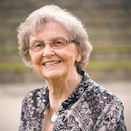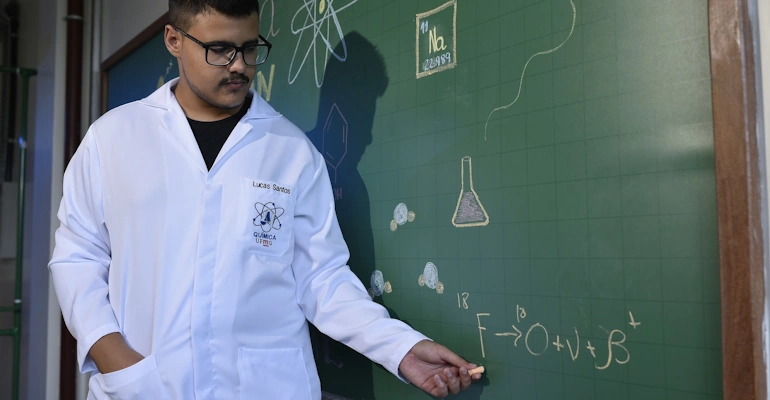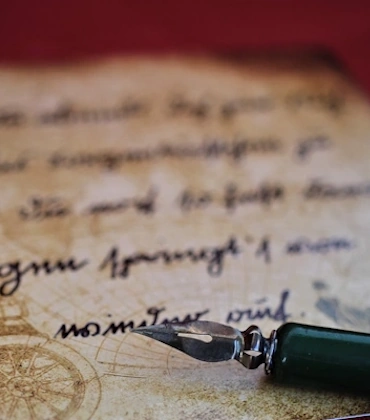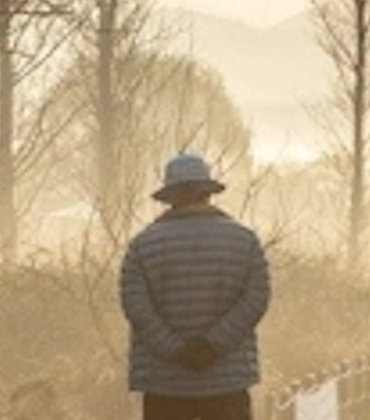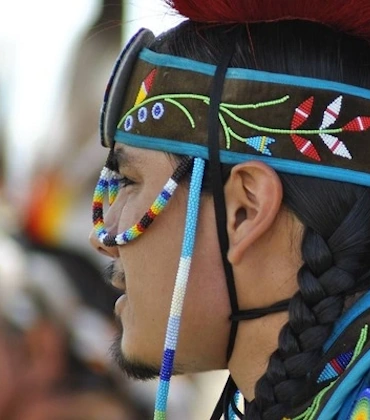
From the Tomato Field to the Mission Field: Glimpses into the Life of Muriel Leonard Davis
Attending William Jennings Bryan College brought many blessings into my life, especially becoming friends and acquaintances with young Christians, serious about pursuing a career in service to God and country. Among those was Muriel Leonard, from near Roanoke, Virginia. She became my roommate after entering college during the second quarter in 1956.
Muriel was born in Blue Ridge, Virginia, on August 4, 1931, the oldest of Anthony L. and Bertha May Leonard’s seven children. As the first born, she was responsible for looking after her younger siblings. Her family lived on a farm, and each child was responsible for specific chores. Regardless of the weather, Muriel milked Nellie, the family cow, twice a day. When summertime came, she was assigned the task of cutting the grass.
Muriel’s parents were a hard-working couple. Her father farmed and worked for the Webster Brick Company before joining the Norfolk Western Railway Company. He and his family raised crops and pigs. In November her father slaughtered the pigs, and. the family helped with that process.
Bertha May took a summer job working in a nearby factory. She took her five older kids to work with her. They played on the grounds and entertained themselves, but whenever an inspector was due, all the youngsters hid in the outside toilet until he had left. Had they been discovered their mother would have lost her job.
The Leonard family attended Glade Creek Baptist Church near their home. Since they did not own a car or truck at that time, the Leonards walked to each service. When Muriel was 13 years old, revival meetings were held at the church. Both she and her dad were saved during those meetings. Although she could not recall the name of the evangelist, Muriel remembered that he lived to be 110 years old and that once, while being interviewed on television, he was asked if smoking was wrong. His answer was:
“If God had wanted you to smoke, He would have turned your nose upside down.” His answer amused Muriel, but she also felt it showed wisdom.
One blind date changed her life. She was persuaded to go out with Charles Davis of Boston, Massachusetts. After that, their lives were never the same, because the next year on September 12, 1958, they were married in Blue Ridge, Virginia. Later she described theirs as a cross-cultural marriage because he was Northerner and she, a true Southerner. The newlyweds lived in Gloucester, Massachusetts, while Chuck, as he was called, completed his studies at Gordon-Conwell Seminary. Their son Steve was born there. After Chuck’s graduation they moved back to Virginia because Muriel wanted to be closer to her family. Their son Steve was born there.
In December of 1962 the Davis family sailed to Europe to study French in Neuchatel, Switzerland. From there in April of 1964 they moved to Linga in the Congo to attend a language school to order to learn Swahili. About three months later in July of 1964, they traveled by truck deep into the forest to Banjawadi, forty kilometers north of Stanleyville, later known as Kissangani. Chuck’s assignment was to teach at the seminary there, but things happened.
Just a few weeks later, the Simbas, a group of rebel soldiers, arrived to remove all Americans to another place where the Red Cross would evacuate them. So they said, but later Chuck and Muriel would learn that was not true.
Since the Davis family were the only Americans at that station, the soldiers crammed the four of them, two adults and two children, into a blue open-topped Opal and headed toward Stanleyville. Steve was only four years old at the time, and Beth, a mere 18 months. Muriel was expecting their third child.
Often during that ride, the soldiers would stop to point their guns in through the Opal windows and threaten the family. Finally, the group reached an air field near Stanleyville and were goaded into a bathroom with 14 men, which included all the staff from the American Embassy.
Later, a man with some authority walked by and noticed the young family being held in the restroom. He ordered the men to let them out immediately. Then they were asked where they wished to go. Chuck and Muriel knew no one in Stanleyville, but a Christian missionary, Kinso, had been on their prayer list. They remembered that he ran a Christian bookstore, and asked to be taken there. As Muriel and Chuck walked around with their children, they kept yelling, “Kinso! Kinso!” When he heard his name being called, Kinso walked downstairs, opened the door, and welcomed them. For two weeks Kinso and his wife took care of the Davises. The family was destitute, with no clothes, except those on their backs, and no money. Fortunately, they did have their passports.
Two weeks later the British council moved the Davis family to Kilometer 8, a mission station that belonged to the Unevangelized Fields Mission. Twenty-eight missionary “refugees” were housed there. For a few weeks Chuck, who had been arrested, remained in prison, but he escaped and was rescued. Then he joined his family.
Then, somewhat ironically, on their wedding anniversary, September 12, 1964, Chuck and two other Americans were again arrested and held as prisoners at the Victoria Residence Hotel along with 235 other American and Belgian hostages.
Back at Kilometer 8, Muriel and the other captives, maintained a “normal” schedule for the sake of the children. The little ones attended “school,” had recess, played games, and drew pictures. From time to time their “normal” routine was interrupted by a sudden appearance of rebel soldiers checking out the compound and claiming to be in search of “imperialists.” A short-wave radio provided a link to the BBC with its updated news reports.
One news flash on November 24, 1964, announced that Cuban mercenaries were on their way to launch a rescue attempt to liberate the prisoners at Kilometer 8. For the first time in three months, the sound of planes soaring overhead filled the captives with hope.
While the occupants sat around the breakfast table, rebels raced into the house, turning the table over and spilling food and dishes on the floor. The hostile soldiers waved their guns in front of Muriel and the others, screaming about how evil the missionaries were. They forced two of the men outside and shot them, killing one, but only grazing the second knocking him to the ground.
Chaos ensued! The rebels ordered all their prisoners back inside and forced them to take seats around the room. They fired randomly around the room, injuring two teenage boys. Then they left. Perhaps they thought they had killed everyone.
After the rebels left, mothers ran with their small children into the woods to hide. There were other African worker hiding in the forest.
A short time later, Muriel and the others heard their names being called. A missionary who had been freed when the Belgian paratroopers and Cuban mercenaries had returned on a rescue mission to Kilometer 8. All twenty-four of those still living were “packed” into a pickup truck and a jeep.
When they arrived in Stanleyville, planes were waiting to transport them to Kinshasa and from there to the United States. Baptist missionaries provided comfort and clothing while those recued waited to be airborne. That happened to be Thanksgiving Day in the United States, and those rescued were served a wonderful meal. Sidney Langford of the African Inland Mission called from New York to tell the missionaries to board the first available plane that would bring them back to the United States. They did not have to be persuaded.
Upon boarding the plane for their return flight, the missionaries were told they were refugees, and, according to Muriel, were treated with lots of tender loving care. Upon arrival, those rescued found their families and loved ones waiting. Those who were stateside had heard wild tales about the treatment of the captured missionaries. One even affirmed that all the prisoners had been eaten by cannibals.
In New York, the Davis family was met by Muriel’s mother, sister and brother-in -law, and by Chuck’s sister and her husband. The Schuit brought apples for the children. Chuck was whisked away to the press room to be interviewed by reporters about the entire ordeal.
Representatives from the Billy Graham Association, Barry Farber of New York Radio, David Reed of Reader’s Digest, Songtime, etc., etc. were there to interview him, as well.
Then while Muriel and the children headed South to Virginia, Chuck went to visit his family in Massachusetts. Thankfully, the children suffered no ill effects from that horrible ordeal, but Muriel was haunted by nightmares for months. What brought her peace was that throughout the experience, as bad as it was, she was sustained by God’s love, grace, and mercy.
After a hiatus of two years in Virginia, they received an invitation from the pastor at the Neuchatel church in Switzerland to return. In April of 1966 the Davis family left for a five-year term there. Their children, Steve and Beth, were excited and happy to attend a French school with Swiss children. Susan, who was born in Roanoke, was still too young to attend school. The Davises worked with a Pastor Cherix to assist missionaries to learn French before going on to the mission field.
Early in 1968 the Congolese pastor and second president of the AIM church, Pastor Balonge, visited the Davises in Neuchatel. He invited them to explore the possibility of returning to the Congo. That invitation appealed to them, and, after prayer and consultation with others, they sold their furniture, packed barrels with their belongings, and returned to the Congo.
The seminary where Chuck had taught was in a new location, in Bunia. They were overjoyed to be back in the Congo, but not long after their arrival, armed soldiers surrounded their house. Muriel yelled for Chuck, grabbed the children, ran into the bedroom, and locked the door. The soldiers were asking for bribes, but when their leader saw Chuck, he apologized and retreated with his men. The experience was alarming, but not long after, Chuck and Muriel moved to Kisangani (Stanleyville), and a time of healing followed.
The Davises remained in the Congo for five years. Then in 1978 they returned to the States because Africa Inland Mission appointed Chuck to serve as their national representative. While he traveled around the country, Muriel remained at home with the children. Their son Steve had graduated from Rift Academy in Kenya prior to their return to the States. After living in Roanoke for one year, he joined the U. S. Army’s 82nd Airborne Division and served for four years.
After a time the Shenandoah Life Insurance Company contacted Muriel, asking her to consider part-time work in their Roanoke office. She had enjoyed working there prior to her marriage, and she accepted their offer. Later she began working full time and continued until May 2008, when she and Chuck moved to the AIM retirement center in Minneola, Florida.
The Davises lived on three continents and had moved many times, but, for Muriel, leaving the Blue Ridge Mountains to settle in Florida was hard. She did not enjoy the heat, the fire ants, the love bugs, and the absence of her beloved mountains, but that would be her last move before God called her home.
Muriel died in Minneola, Florida, on November 19, 2021. Her ashes were returned to the cemetery in Virginia where her parents were buried. Hers was a life well lived, and she continues to be an inspiration to those who knew her. My friendship with her certainly brought blessings into my own life.

